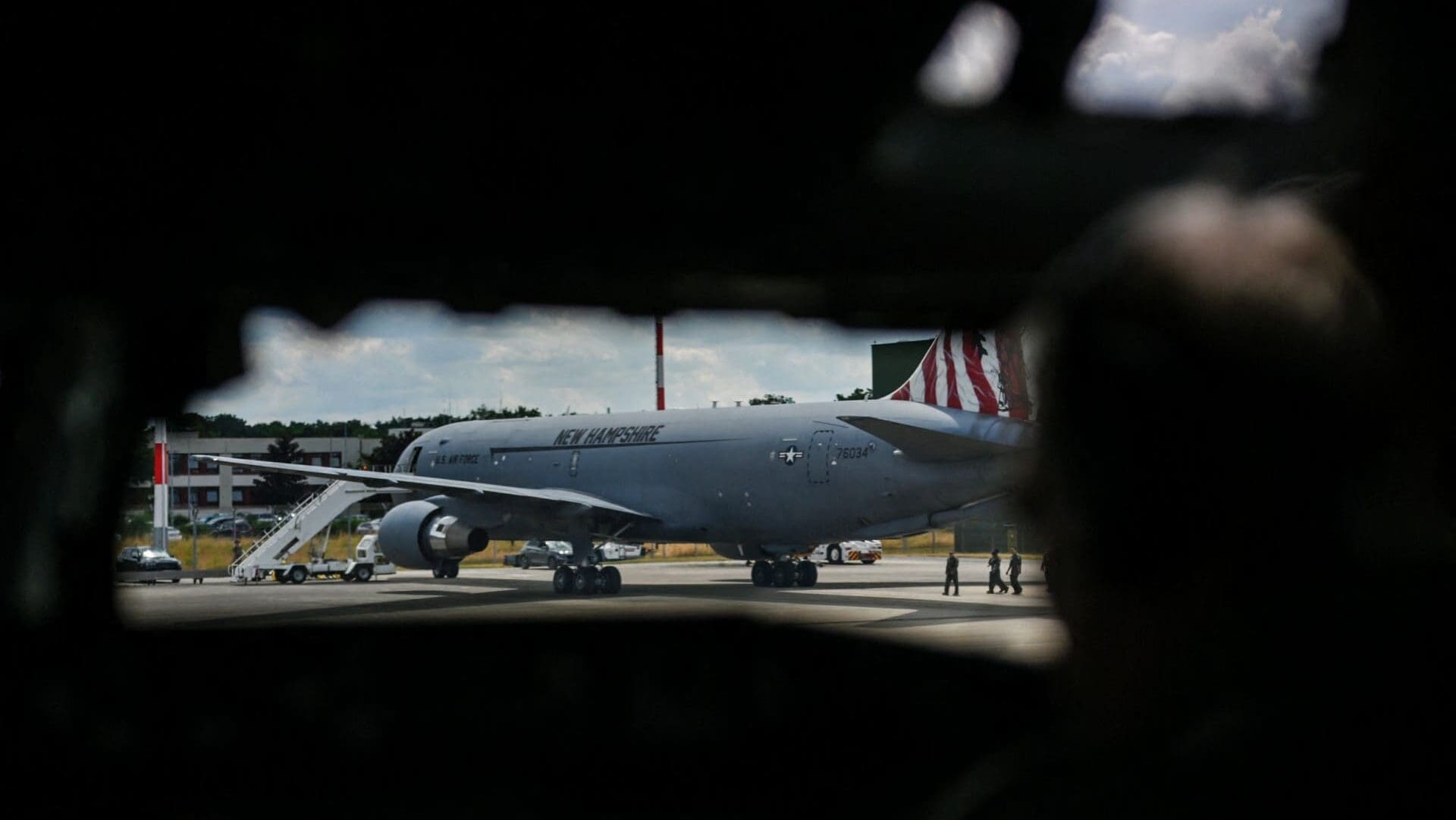
A tanker aircraft is seen through the cockpit of a NATO Airborne Warning and Control System (AWACS) aircraft, which participates in the German-led multinational exercise Air Defender 23, during a flight over northern Germany from the military base of Geilenkirchen, western Germany, on June 20, 2023.
Photo: Ina FASSBENDER / AFP
The NATO air base in the western German town of Geilenkirchen has raised its security level “based on intelligence information indicating a potential threat.”
“All non-mission essential staff have been sent home as a precautionary measure. The safety of our staff is our top priority. Operations continue as planned,” the base said late on Thursday, August 22nd, in a statement on the social media platform X, without giving details.
🚨We raised the security level at NATO Airbase Geilenkirchen based on intelligence information indicating potential threat. All non-mission essential staff have been sent home as a precautionary measure. The safety of our staff is our top priority. Operations continue as planned.
— NATO AWACS (@NATOAWACS) August 22, 2024
The threat level has been raised to Charlie, the second-highest of four states of alert, which is defined as “an incident (that) has occurred or intelligence has been received indicating that some form of terrorist action against NATO organisations or personnel is highly likely.”
The base, where NATO AWACS surveillance aircraft are stationed, remained on high alert on Friday.
The announcement comes only a week after a German military base next to Cologne airport had to be sealed off, and the soldiers there were told not to drink tap water, as authorities investigated a possible act of sabotage of the water supply. The test results later showed that the tap water had not been contaminated. The NATO base in Geilenkirchen also raised its security level last week when a suspicious person attempted to enter the base.
A spokeswoman said there is no connection between the incident in Geilenkirchen last week and the one this week.
NATO Secretary-General Jens Stoltenberg and German Interior Minister Nancy Faeser have in recent months both warned of growing sabotage and espionage threats by Russia.
In April, investigators arrested two German-Russian men on suspicion of spying for Russia and planning attacks in Germany—including on U.S. army facilities—to undermine military support for Ukraine. Russian saboteurs were allegedly behind an arson attack in May on a Berlin factory owned by German metal manufacturer Diehl, which manufactures air defence systems used by Ukraine. The United States and Germany reportedly foiled a Russian assassination attempt against the head of the Rheinmetall arms manufacturer which has been producing artillery shells and military vehicles for Ukraine.
According to the report by the German Office for the Protection of the Constitution, Russian espionage activities “extend with varying intensity to the target areas of politics and administration, business, science, technology and the military.”
In another possible act of espionage, German authorities announced on Thursday that suspicious drones have been sighted circling above an industrial park in the northern town of Brunsbüttel.
“The Flensburg public prosecutors office confirms the launching of an investigation due to the suspicion of espionage activity for sabotage purposes, in connection with repeated drone flights over critical infrastructure in Schleswig-Holstein,” a spokesman said. Repeated drone flights over the area have been observed since August 8th.
Police specialists are theorising that the high-speed drones could be Russian military espionage vehicles.
The industrial park around the harbour in Brunsbüttel is home to a new floating liquid natural gas (LNG) terminal. This was set up with government support in response to Russia’s invasion of Ukraine and amid Germany’s hurried efforts to source energy imports from elsewhere. The area is also the entry point to the Kiel Canal that links the North Sea at Brunsbüttel to the Baltic Sea at Kiel-Holtenau, used by roughly 30,000 ships per year, Deutsche Welle reports.
The sighting of suspicious drones is not a new phenomenon. Chairman of the Bundestag’s defence committee Marcus Faber said at the beginning of the year that drones were regularly sighted over a Brandenburg military training area where Ukrainians are trained to use Leopard 1 tanks.
